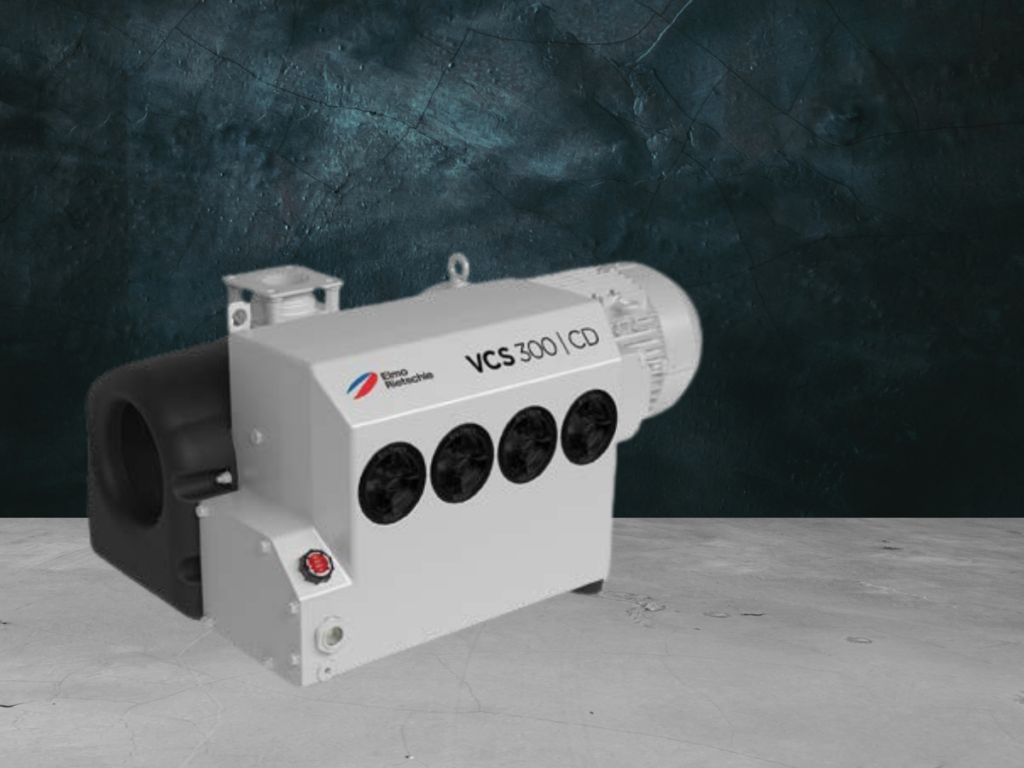Is an Oil-Sealed or Dry Rotary Vane Pump Right for My Application?
Rotary vane vacuum pumps, offer reliable solutions for a broad range of food, packaging, chemical, pharmaceutical and other industrial applications. Further, because they are available as oil-lubricated and dry rotary vane pumps, these robust vacuum pump options may serve in both general and sensitive pump applications. This blog will explore the differences between oil-sealed and dry rotatory vane pumps, as well as their suitability for various vacuum pump applications.

What is a Rotary Vane Pump
A rotary vane vacuum pump, is a positive displacement pump that uses rotating vanes to generate a vacuum. In operation, the vanes slide in and out and turn against the inner wall of the stator. As the vanes rotate, a chamber is formed. The air or gas enters the suction side of the chamber and is compressed with each rotation. When the suction chamber reaches maximum capacity, the contents are released into the discharge chamber and sent out via a pump outlet.
Rotary vane vacuum pumps are critical in pump applications where precise and continuous control, as well as high levels of consistent and reliable operation, are critical. Heavy-duty rotary vane pumps are also available and offer extra robust construction for handling demanding, continuous, high volumes or in harsh industrial environments.
What’s the Difference between Oil-Sealed and Dry Rotary Vane Pumps?
Oil-sealed rotary vane pumps have been reliably serving in various vacuum pump applications for decades, but more recently there has been a demand for dry models. Here, we will explore the difference between the two.
Oil-sealed rotary vane pumps are durable and dependable pumps because the oil provides lubrication that reduces friction, prevents corrosion and reduces operating temperatures, which reduces wear and tear and encourages a longer useful life. The oil serves as a lubricant, cooling fluid and a sealing agent, which permits a reliable vacuum to be formed and held.
Mechanically simple, oil-sealed rotary vane pumps offer a lot of advantages including long vane life, low noise levels and low maintenance. They can maintain a consistent vacuum over long periods, which makes them essential in applications that require stable vacuum conditions. They are versatile and can handle a range of air and gases, making them adaptable to many different industrial applications. However, oil-lubricated rotary vane vacuum pumps may contaminate the process with oil and disposing of used oil can be costly.
This is where dry rotary vane pumps shine. Because they do not use oil and will not contaminate the process or product, they are widely used in applications that demand higher levels of cleanliness or sterility. However, dry rotary vane pumps cannot handle moisture, so they run a high risk of internal corrosion if moisture is introduced to the internal components. They are typically louder in operation than oil-sealed versions.
Applications for Oil-Sealed and Dry Rotary Vane Pumps
Versatile oil-sealed and dry rotary vane pumps are widely used in many industrial applications.
Oil-lubricated rotary vane pumps can be found in the following pump applications:
- General industry: Rotary vane vacuum pumps are often used in drying, dust extraction, industrial furnaces, heat treating and pneumatic conveying applications in general industry.
- Packaging industry: A rotary vane vacuum pump can be found in packaging machines, centralized vacuum systems and vacuum packing equipment.
- Coating industry: Rotary vane pumps can be used in applications for coating metal, plastic and glass.
- Process industries: Process industries often use rotary vane pumps for consistent flow.
Dry rotary vane pumps can be found in the following pump applications:
| Chemical and pharmaceutical processes | Dry rotary vane pumps might be used in high-purity chemical and pharmaceutical applications such as crystallization, degassing, distilling, drying, evaporating, super cooling, vacuum coating and filtration. In pharmaceutical applications they apply vacuum during vial filling. |
| Food processing | Dry rotary vane vacuum pumps might be applied in bottling and filling, cutting, food packaging and vacuum packaging applications that demand cleanliness for food safety. Dry rotary vane pumps may be used for sealing moisture-free food products such as dry beans and rice and freeze drying food. |
| Electronics | Dry rotary vane pumps may be used in electronics manufacturing such as in the lamination of solar battery products, LCDs and mobile phone displays. |
Essential in many vacuum pump applications throughout a wide variety of industries, rotary vane vacuum pumps provide reliable service in operations that require consistent levels of vacuum. Because they are available in both oil-sealed and dry rotary vane pump types, as well as heavy-duty rotary vane pumps, they can be used in general manufacturing applications, as well as applications in the food, chemical and pharmaceutical industries that demand clean operation. For assistance selecting a rotary vane vacuum pump that suits your application, please contact the experts at JHFOSTER, a Tavoron company, today.
